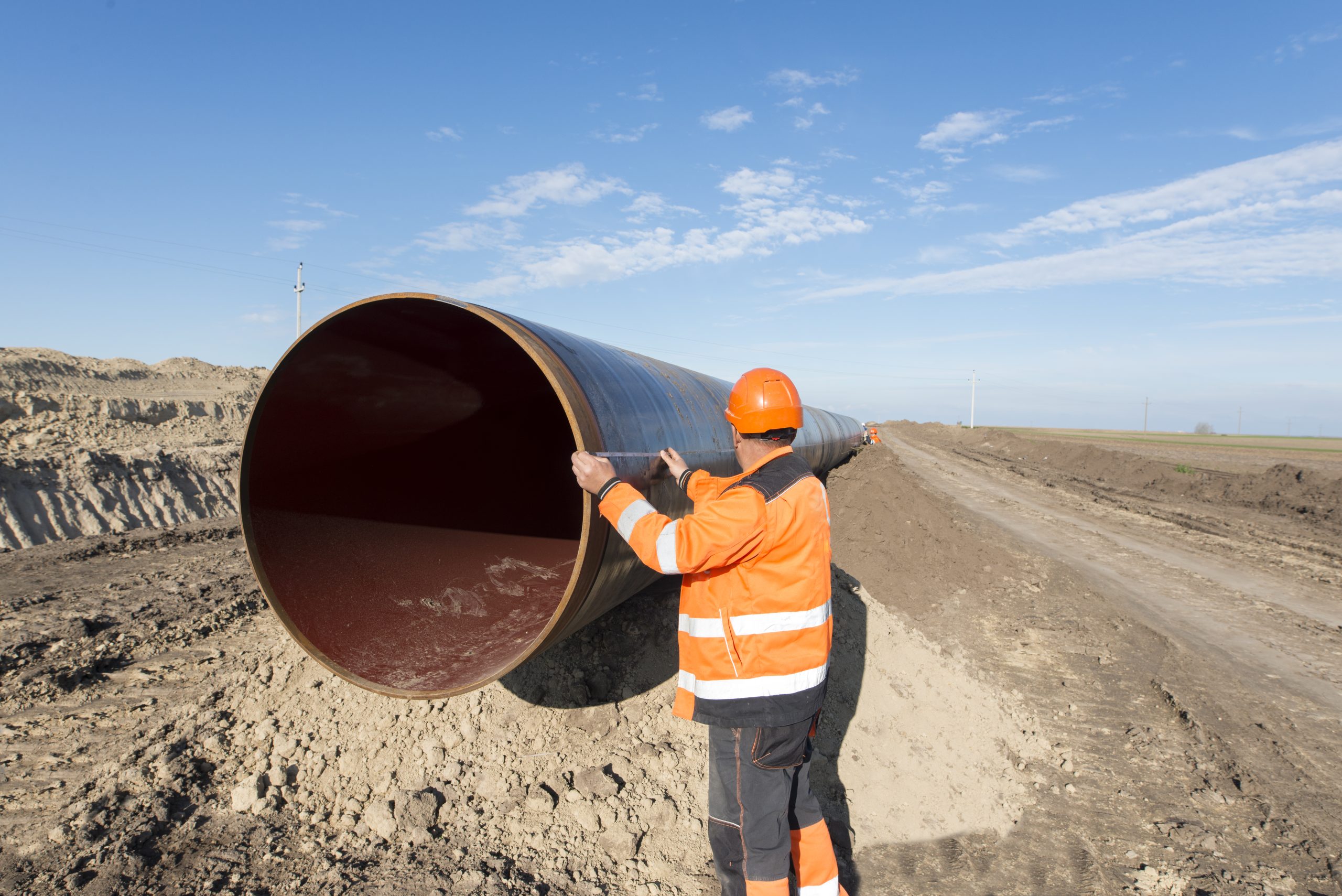
Pipeline workers measuring tube length for construction of gas and oil pipes.
Selecting the appropriate pipeline construction contractor in Texas is a crucial consideration that can significantly impact your upcoming project. The size, scope, and type of your infrastructure, oil, gas, water or utility, will affect timelines, costs, safety, compliance, and durability. Here are ten helpful tips to assist you in making an informed decision:
Ten Things to Keep in Mind to Find a Reliable Pipeline Construction Company
1- Experience Matters
Constructing pipelines is complicated and more difficult than general construction. Pipeline construction involves complex engineering challenges and construction methods, as well as safety performance, environmental protection, and adherence to regulations. A contractor with experience will have:
- Significant years of pipeline construction experience in Texas.
- Experience with various types of pipe materials, including steel, poly, fibreglass, etc.
- Experience with different types of environments, such as urban villages or totally remote locations.
An experienced contractor will have the ability to see problems before they arise and deal with them efficiently.
2. Examine Their Equipment and Technology
Pipeline projects require a variety of heavy equipment and new tools. Your contractor should be able to provide:
- Trenchers, excavators, directional drilling (HDD) machines, and backhoes
- Welding machines, pipe lifting equipment, and pressure testing tools
- Mapping systems, drones, and digital project tracking.
Having the appropriate equipment increases productivity, accuracy, and safety on the job site.
3. Check Licenses, Certifications, and Compliancy
Pipeline work in Texas is highly regulated. Your choice of contractor should be:
- Licensed by all necessary local and state agencies
- Certified for OSHA and Department of Transportation (DOT) standards
- Experienced with environmental permits and land use rules
Following proper compliance from the beginning can help eliminate potential project delays and legal issues.
4. Assess Safety Standards
Safety must be paramount in pipeline construction due to the significant risks associated with the work. A reliable contractor will possess a solid safety record and follow safety procedures by:
- Maintaining a low incident rate and clear safety procedures
- Providing personal protective equipment (PPE) and ongoing staff training
- Conducting job hazard analyses and emergency training or drills
- Testing and inspecting equipment and all installations on a frequent basis
Safety procedures not only keep the workers safe but also provide the least amount of downtime to the project, as well as less liability.
5. Assess Project Management and Communication
You need to manage your project in order to maintain your schedule and budget. An effective company should also provide:
- Thorough pre-construction site investigations
- Assertive and achievable timelines with clear milestones
- Definitive and transparent budget estimates and billing process
- Accessible updates and communication through a single point of contact
- Efficient communication helps keep everyone aligned and informed.
6. Check for In-House Fabrication and Other Services
Many pipeline projects require custom fabrication and services in addition to standard installations. Ask yourself if your contractor can:
- Fabricate elements such as valves, risers, and compressor stations
- Provide coating, welding, sandblasting, and pressure testing in-house
- Provide underground installations together with above-ground elements such as catwalks and pump stations.
By providing fabrication and services in-house, you can have a more quality-controlled solution versus passing it along to a subcontractor.
7. Understand Their Navigation Planning Process
Proper navigation planning minimizes the chance of environmental impacts and logistical issues. Your contractor should be able to:
- Test soil, flood issues, wetlands, and protected habitats
- Coordinate with landowners, municipalities, and utility providers.
- Use trenchless methods, such as horizontal directional drilling, where applicable
- Ensure a rapid and efficient permit and access agreement.
- Strategic planning limits delays, community conflicts, and
8. Select a Contractor That is Right-Sized for the Project
As described above, you will want to use a contractor whose sizes match the size of the project. Engaging ordinal contractors that are either too big or too small poses problems. Consider the following:
- Previous projects that are similar in scope and size
- References from clients who are similar and have similar needs
- If the contractor can provide appropriate focus and attention to detail
Choosing a properly sized contractor will ensure you are utilizing resources properly, Classification and will lead to better project results.
9. Look for Long-Term Value, Not Just the Lowest Price
Price is always an important consideration. However, the lowest price does not always mean you are getting the best value. In this case, shadow pricing would be of wonders in price by considering value and often getting you to better ones. Compare the proposals on the basis of the goal to save the hole.
- Quality of materials and workmanship
- Maintenance and repair expectations
- Warranty coverage and support services
- long-term usability and energy usage
When engaging and elevating to a propensity toward price, very few contractors commit to forecasting costs that will ultimately impact your overall project estimates.
10. Responsibly address environmental and social accountability
Pipeline construction can directly affect the environment and neighbouring communities. A responsible contractor should:
- Make contact with regional landowners and nearby environmental teams whenever possible
- Minimize environmental impact during training when possible.
- Rehabilitate and restore the community by replacing topsoil and re-vegetating with new vegetation.
- Ensuring an ethical practice and long-term sustainability.
Because Project X involved disrupting and, to a lesser extent, construction or installation, contractors should make every effort to respect the community and the attendees’ interaction with the community.
Don’t Forget Post-Construction Testing And Maintenance
A successful project does not finish when you bury the pipeline. Make sure that the contractor is ready to perform
- Hydrostatic or pressure testing to verify integrity
- Non-destructive inspections, like ultrasonic or radiographic testing
- Cathodic protection systems to mitigate corrosion
- Maintenance and cleaning strategies (e.g., pigging)
- Final site restoration and erosion control
Effective post-construction care is the best way to ensure a pipeline will be safe, effective, and compliant for years after construction.
Final Thoughts
Building a pipeline in Texas can come with unique challenges. On the one hand, Texas has its own regulatory landscape, and Texas is a large and diverse state. There are many pipeline contractors available to build your project, but you should make sure to ask questions and find contractors that are offering these attributes:
– In-depth legacy experience in your industry
– Sophisticated tools and equipment
– Safety culture
– Regulatory experience
– Project management experience
– Fabrication capabilities
– Local knowledge of land use and permitting
– Value-priced with value-added services
– Environmental and community stewardship
With the right pipeline construction company, you can feel confident that your project will proceed smoothly, on schedule, and with longer-lasting adherence to the agreed-upon specifications. Take your time, conduct thorough research, ask questions, verify qualifications, and hopefully enjoy the experience of building a strong pipeline. A good partner is a good foundation for a successful pipeline! More








